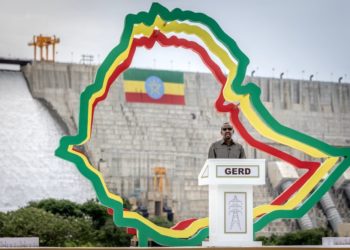Sven Kühn von Burgsdorff is the former EU ambassador to the Palestinian Territory.
The war in Gaza has again exposed the fragility of the Middle East. It has also laid bare the failure of European and Arab nations, as well as the global south, to collectively leverage their influence to end the bloodshed and achieve a sustainable political solution.
Gulf countries and the global south have historically voiced support for Palestine, but much like Europe, their rhetoric needs to translate into decisive action. Otherwise, the cycle of violence will persist, while peace and regional stability remain elusive.
Arab states know better than anyone that a durable peace is impossible without resolving the core conflict. And the Saudi-led Arab Peace Initiative’s recent proposals, as well as the Egyptian plan to end the war, underscore the need for a collective approach that holds Israel to account and lays the groundwork for negotiations leading to Palestinian independence. But these countries must now move beyond diplomatic initiatives to shape and implement long-term policies by leveraging their political, financial and diplomatic clout.
Led in Washington by U.S. President Donald Trump’s son-in-law Jared Kushner and other administration officials who lack both credibility and expertise, recent U.S.-Israeli discussions on Gaza’s future seriously jeopardize any sustainable peace, as they ignore the key demand of Palestinian self-determination while serving Israeli Prime Minister Benjamin Netanyahu’s narrow political interests. Arab states can’t allow these efforts by extremist factions in Israel’s government to dominate the agenda. Instead, they should push for greater international coordination on a realistic, comprehensive regional policy — especially with Europe and the global south.
Of course, meaningful reform of Palestinian governance is also vital. Israel has been reinforcing and exploiting Palestinian divisions for far too long, using them to justify any lack of credible engagement in peace efforts. Palestinians need to establish a unified, democratically elected government that represents both Gaza and the West Bank, including East Jerusalem. To this end, Arab states, Europe and their international partners should demand a transitional unity government, followed by steps toward elections under international monitoring.
Only legitimate Palestinian leadership can effectively implement and safeguard statehood.
As Israel’s largest trading partner, the EU wields significant influence here — if it’s willing to act. Germany’s recent suspension of some arms exports is a step in the right direction, but European leverage must be amplified through the enforcement of international law. Arms embargoes, investment restrictions and the suspension of trade agreements should be complemented by measures targeting settlement products, dual-use equipment and machinery, technology exports as well as research cooperation. Multilateral sanctions, for example, would be the most effective response.
Meanwhile, outside of Europe, leaders from China, India, Russia, Azerbaijan and the United Arab Emirates have been calling for Palestinian sovereignty at the U.N. However, they too maintain significant trade, energy and technology ties with Israel — even as bombs fall on Gaza, and Israel continues to expand its unlawful presence across occupied Palestinian territory.
Concentrated in technology and machinery, China’s trade with Israel reached almost $16.3 billion in 2024. India’s trade with Israel stood at almost $5 billion in 2024, including arms purchases. Azerbaijan remains a key energy supplier, exporting $1.12 billion worth of oil to Israel between January and June 2024. And the UAE’s trade with Israel soared to $2.8 billion between October 2023 and August 2024, making it by far the most important trading partner among Arab countries that have normalized commercial relations with Israel.
Alas, Turkey’s most recent decision to sever all commercial ties with Israel over its war on Gaza is the exception not the rule.
Such economic entanglements highlight the disparity between words and deeds. Gulf nations and wealthier global south countries possess more room to influence events than they’re currently utilizing. And as Israel’s main trading partner, Europe should play a key role in implementing measures that hold Netanyahu’s government to task, working closely with global south partners to synchronize sanctions and trade restrictions.
Coordinated actions with the Hague Group, where South Africa and Colombia play a leading role in ensuring legal accountability before international courts, and joint initiatives in the U.N. could also generate significant pressure.
This month’s U.N. General Assembly meetings offer a crucial opportunity to forge a global coalition that holds the Netanyahu government accountable for occupation and war crimes, supports Palestinian democratic development and leverages economic tools to enforce international law. The Global Alliance for the Implementation of a Two-State Solution, which will meet during UNGA, could also serve as a pivotal platform to bolster cooperation between Arab, European and global south countries.
A committed, coordinated international effort — one that combines diplomatic pressure, sanctions, legal accountability and support for Palestinian democratic renewal — is essential to ending the war in Gaza and advancing a just, sustainable peace. Only through shared resolve and strategic action can the prospect of Palestinian statehood and regional stability become a reality, allowing Palestinians and Israelis to finally coexist in peace and security.
The post After the Qatar strike, Gulf nations need to get tougher on Israel appeared first on Politico.




